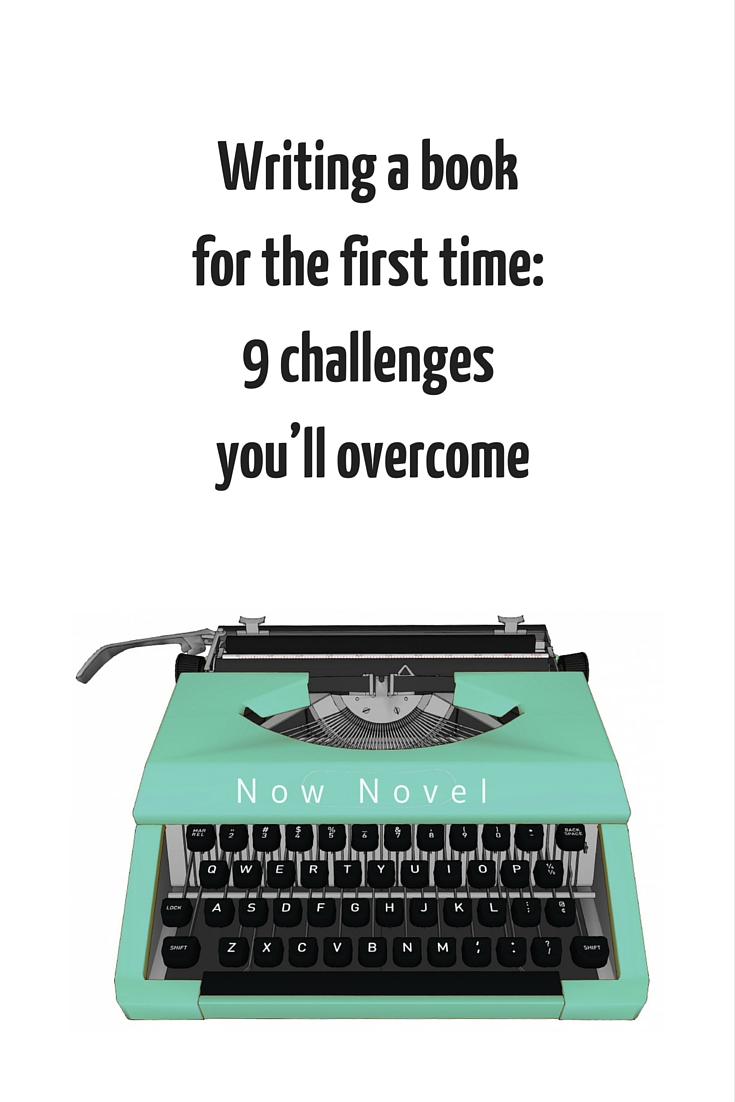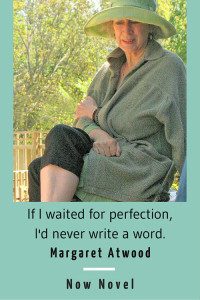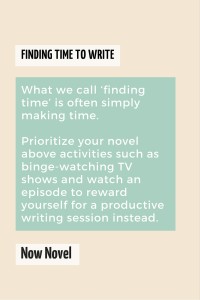Writing a book for the first time is an exciting but also challenging process. Worldbuilding, creating your characters and plotting scenes are fun processes of discovery, but first-time novel writers often encounter setbacks too. These challenges cause many unprepared writers to give up on their novels, but you can overcome them with the right mindset and methods:
Challenge 1: Not knowing where to start
Do you start writing a book from the beginning? The middle or end? Do you plan scene settings or character conversations and actions first? These are common questions many first-time novelists have about the writing process.
The truth is that there’s no single best way to start writing a book. Some suggestions for making a start:
- Use the Now Novel ideas finder. It’s a step-by-step process that will guide you through the process of creating a novel blueprint and refining your story idea.
- Write down a list of the parts of creative writing you enjoy most in order of preference. Start with your favourite part of the process (whether it’s writing scene settings or devising plot) so motivation is high from the outset.
- Just write: If the blank page is daunting, do freewriting. Put anything down on the page that pops into your thoughts for ten minutes. Do this exercise until a phrase or an image grabs you and you want to continue the story.
Challenge 2: Worrying your idea isn’t good enough
You might not be as confident as a seasoned author. Even if you have written multiple books, you might still worry your story idea isn’t great. To build confidence, it’s important to be open to helpful feedback. Ask others what they think of your story concept. Here are several ways to test your idea to see whether it will sustain an entire book:
- Read Randy Ingermanson’s answer to a worried writer who thought he had a boring novel idea (Randy reminds us that there are few truly original story ideas).
- Write a version of your novel in miniature, as a short story, first. Does it grab others whom you share it with? Do you (or they) feel it could use more detail and expanding?
- Remember that even the most ‘boring’ or ‘simple’ idea can become a fascinating book if description and character are written imaginatively. Virginia Woolf’s Mrs Dalloway is mainly about a woman buying flowers for a party and a man struggling with mental health issues but it’s widely considered a 20th Century masterpiece.
Challenge 3: Stopping writing to pursue a competing idea
Chronic indecision is something that countless writers experience while drafting their first novels. You might have come up with a great concept or you might have sketched a great protagonist. Yet when you get into the labour of writing, suddenly that other idea about a society where X group has Y unusual law or ability is more appealing. File away competing ideas that don’t fit into your current story. They’ll still be there when you’re done.
Notice when other story ideas start to distract you. Is there a particular place in the writing process that you feel the strongest urge to start afresh? If you can identify the bumpy passage that makes you abandon ship, you can circumvent it by focusing on the aspect of craft that challenges you most.
Say, for example, that you’re finding your characters too much like cardboard cutouts. You might think ‘but this other character idea is better, that’s why I’m struggling’. Instead, work on your skill at character writing. You could:
- Make a list of your favourite characters from books, films or TV and re-read/re-watch them, noting down every distinguishing characteristic (such as mannerisms, style of speech and physical appearance).
- Read advice on how to write better characters.
- Put together a collage of images that you associate with your character and use these for inspiration.
If you are the writer who abandons story ideas repeatedly for newer, more exciting ones, you might be surprised to find that there’s a particular challenge (whether structural or craft-related) that is the real cause of your losing interest.
Challenge 4: Being an over-scrupulous editor
Editing is important. A good edit is what separates many a mediocre to good book from a prize-winning one. But it’s easy to be over-zealous about editing when writing a first novel.
Every writer has a slightly different process. One person might prefer to write a synopsis of each chapter scene by scene before starting, while another might be a pantser, writing the whole novel from start to finish with minimal outlining.
Resist the temptation to edit excessively as you draft, however. When you’re writing your first novel it’s easy to put a lot of pressure on yourself to make every single word and line sing. But it’s like Margaret Atwood says: if you wait for perfection, you might never write a word.
Here are three ways to overcome the overwhelming desire to edit your writing excessively:
- Make drafting a game and set a timer for x number of minutes and a word count you have to reach. Don’t stop writing – even to read the last line – until you reach the target or the timer runs out.
- Give yourself permission to be bad. Tell yourself you’re going to write the worst, most typo-filled book of all time. Let your prose be the deepest shade of purple for now.
- Dictate your draft into a voice recorder or mobile recording app and transcribe later. You might feel embarassed to read out loud, but you can always find a quiet spot somewhere where nobody can overhear.
Challenge 5: Not finding time to write
When we ran a poll on the blog, so many of you said that you just can’t seem to find the time to write. Here are some points to remember:
- What we call ‘finding time’ is often simply making time. Prioritize your novel above activities such as binge-watching TV shows and watch an episode to reward yourself for a productive writing session instead.
- Aim small and build up: You can even have an initial target of 100 words a day. That might seem like nothing but it adds up to over 3000 words of rough draft per month.
- Get help from loved ones: If you have young children, for example, ask your significant other or a relative to entertain them and keep them occupied for an hour or two every other day. Create ‘you’ time that is unnegotiably devoted to your writing.
Challenge 6: Getting writer’s block
Writers aren’t the only creative types who experience creative block. Artists and musicians get it too. A sensation that you simply cannot come up with anything or a dispirited feeling that you have nothing to say or create.
You may need to pursue an activity that will inspire you or jolt your creativity. You may also need to ease up on self-criticism or an internal censor that’s stopping you from saying exactly what you want to say (or are most afraid to put on paper).
Read this guide to 14 proven methods for getting rid of writer’s block and remember these techniques if you’re struggling to put words down.
Challenge 7: Feeling isolated
Many writers are more introverted than the average person and thus need plenty of alone time. Even so, when writing a first book you might not be used to the long periods of time you’ll be spending with your own private thoughts and writing process. Isolating yourself because you want to finish your book is a bad idea because one of the best sources of inspiration is other people. Ways to make sure you balance (playful) work and outright play:
- Join a writing group.
- Make social events frequent rewards for reaching small milestones.
- Only allow yourself to write a set number of words per week. Spend the rest of the time pursuing other reinvigorating and inspiring experiences.
Challenge 8: Believing in the myth of the ‘born’ writer
When you’re writing your first book you might worry that you’re ‘not meant to be’ a writer. You might look at a published author’s dazzling prose and think ‘they’re a born writer, look how easily great lines come to them’.
The truth is that even if some writers have a more uncanny ability with words and a well-developed sense of rhythm and flow, writing is still work. With writing, as with all disciplines, you get out what you put in. If you’re worried you’re not a born writer, read published authors’ words on their biggest writing challenges. You might be surprised to see just how much even the greatest authors have struggled. Perseverance is key. For inspiration, read this post on 25 successful writers and their biggest challenges.
Challenge 9: Losing writing momentum and motivation
Starting a novel is often when you feel most motivated and momentum is strongest. As time goes by, your motivation will waver at times. There will be days where you don’t want to write at all, even though you’re lagging behind your word count targets. Here are some ways to maintain momentum and increase your motivation:
- Get a writing coach: Having a coach who is available to talk through any obstacles and provide suggestions and encouragement when the going gets tough will help you stay focused.
- Switch things up: Change the room you’re writing in, the time of day you usually write or jump into a different part of the story if you are finding a section hard to work on. Come back to the problem area when you are most committed to getting the tricky part out of the way.
- Try establish regular days of the week and writing times. This becomes a date you look forward to and so does your ‘muse’. It trains the brain to start combining words and ideas subconsciously, on cue.
- Join a supportive writing group and talk to other writers about challenges you are facing or any topic that interests you. Others with similar goals to your own will egg you on.
Although writing a novel for the first time presents many challenges, with the right methods and process you can keep focused and productive until you have a final manuscript in hand.




7 replies on “Writing a book for the first time: 9 challenges you’ll overcome”
I have struggled with at least 5 of these! In particular I found myself, via the tried and tested method of overthinking, succumbing to challenges 2,3, and 4 –– which, to me, seem very much related.
Given I’ve written books in the past (albeit nonfiction) and that I’m a pretty confident character, it shows that anyone can succumb to self-doubt, especially if they feel isolated. This is where your excellent advice in ‘challenge 7’ comes into place. Thanks for an excellent post, and an excellent blog. Sharing! 😉
Thanks for sharing your particular writing challenges, Adrian. I’m glad that you have a plan for how you’re going to overcome them, all speed to you. Thanks for sharing my post too!
Genuinely, I’m very happy to share, Bridget –– this is an excellent blog and I’m finding the posts here helpful and shareworthy!
‘The loneliness of the long distance runner’ is nothing compared to being a writer.I am writing my first novel -historical fiction, and find my main character either sitting on the verander in Cape Town’s Groote Schuur with Cecil John Rhodes or meeting Percy Fitzpatrick on a train, long before he wrote ‘Jock of the Bushveld’. The dialogue is extremely challenging but enjoyable, especially when applying historical facts, and having to remove myself from the narrative when my own moderately liberal thoughts seek to invade the conversation. After four years there is no possibility of quitting. It is a most incredible experience joining the adventures of a character I created. There are times when I have wept as he struggles to overcome the challenges in his life, and smiled as he realizes he has purpose beyond everything he has ever imagined. .
Thank you for sharing your process and experience, Bill. Sounds like an interesting historical focus. It’s lovely when characters start to feel as real and close as friends and family. Dialogue is a challenge indeed, especially if it needs to have a degree of historical sensibility. Good luck with the remainder!
[…] So far, my ‘writerly’ journey did not bear the fruit I wanted. I received more rejections for my novel than expected and bawled when I lost my website and 4 ½ years of content for my blog. To say I was distraught was putting it lightly. But I came across an interesting article that helped put a few things in perspective: https://www.nownovel.com/blog/writing-a-book-for-the-first-time-challenges/ […]
[…] motivation. The good news is that with the right mindset and techniques, these challenges can be overcome, paving the way for a successful writing […]